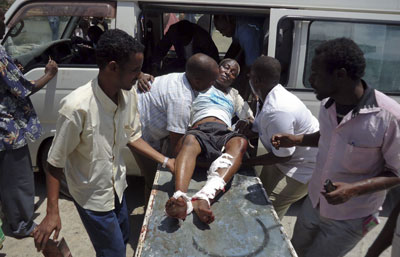New York, April 4, 2012–At least 10 journalists were reported injured, several of them seriously, when a bomb ripped through Somalia’s newly reopened national theater in Mogadishu, local journalists told CPJ. The blast, for which the militant insurgent group Al-Shabaab took responsibility, killed several people, including two of the nation’s top sports officials, news reports said.
The attack came five minutes into a speech by Prime Minister Abdiwelli Mohamed at a ceremony marking the anniversary of Somali National Television. Witnesses said they believed a suicide bomber had carried out the attack, but Al-Shabaab said it had planted the explosives in advance, The New York Times reported.
“It was awful. People were running in all directions in stunned panic,” one journalist told CPJ. The journalist, among a group of reporters covering the ceremony, noted that the blast came “just as things seemed to be getting better” in Mogadishu, an appraisal born in part by the theater’s reopening last month two decades after it closed amid the nation’s violent upheaval.
The blast killed Aden Yabarow Wiish, president of the Somali Olympic Committee, and Said Mohamed Nur, chief of the country’s football federation, according to news reports. Several others were reported dead.
Initial reports said at least four journalists suffered serious injuries and were being treated at hospitals in the capital. Local journalists told CPJ that Said Shire Warsame of Shabelle TV sustained burns across his body, while Radio Kulmiye reporter Ahmed Ali Kahiye suffered internal bleeding. Ayaan Abdullahi of S24 TV suffered head, stomach and leg injuries, they said, while Somali Channel TV reporter Hamdi Mohamed Hassan sustained head and leg injuries.
Deeqa Mohamed of state-run Radio Mogadishu suffered shrapnel wounds, local journalists told CPJ. Five other journalists were also reported injured: Mohamed Noor Mohamed Sharif of UN-backed Radio Bar-kulan, Somali National Television staffers Mikail Hassan Ali and Abdulkadir Mohamed Hassan, and freelance journalists Suleiman Sheikh Ismail and Mulki Hassan Haile.
“Despite reports of improving conditions in Mogadishu, this attack shows that civilians, including journalists, remain exceedingly vulnerable,” said CPJ East Africa Consultant Tom Rhodes. “Somalia remains the region’s most dangerous nation for the press.”
The re-emergence of sports and other forms of entertainment, including the reopening of the national theater, had been seen as evidence of improvement after government and African Union forces ousted Al-Shabaab from the capital last year.
In Mogadishu and elsewhere in Somalia, Al-Shabaab has continued its attacks on civilians, including journalists. In 2012, militants are believed responsible for the killings of journalists Ali Ahmed Abdi in Galkayo and Abukar Hassan Mohamoud in Mogadishu, and the non-fatal shooting of Moyhadin Hassan in Mogadishu. Somalia is Africa’s most dangerous country for the press, according to CPJ research.
- For more data and analysis on Somalia, visit CPJ’s Attacks on the Press.
